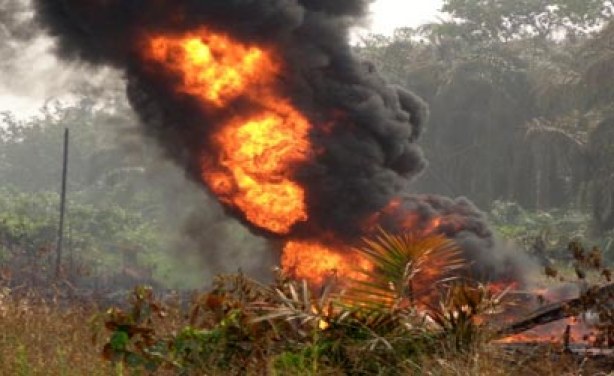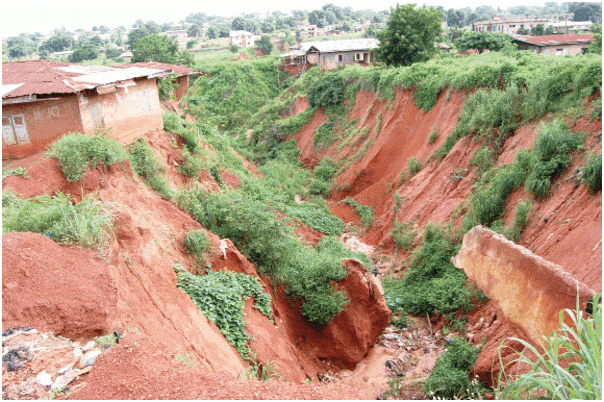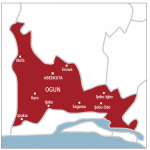
Chima Nwafo
From desert encroachment up-North, the deepening erosion in the South-east, the raging flames of gas flaring and unmitigated pollution from oil exploration activities in the Niger Delta to the seasonal flooding in the South-west and entire states of the federation, Nigeria could be said to be floating in a cesspool of environmental despoliation. But it is not a recent development.
Even though un-noticed or rather deliberately ignored by the colonial government, Nigeria’s environmental pollution began from the first oil exploration activities of Shell D-Arcy at Iho, Owerri in 1951 to January 1956 when the first successful well was drilled at Oloibiri in today’s Bayelsa State. First successful connotes there were other unsuccessful explorations within the period. And a year after the 1972 Stockholm Conference on the Human Environment that birthed World Environment Day (WED) – two years before the first global observation of the event in 1974 – Nigeria experienced her worst climatological drought in most parts of the North. That was precisely in 1973. The drought was so severe that it affected water levels in both Lake Chad and River Niger. As if sequentially ordered, this was followed by consistent desert encroachment, gully erosion and flare and flash floods in different parts of the country.

In the case of floods, one would ordinarily expect this to be a problem in the coastal and erosion-prone areas, but it is not. As captured by media reports during the rainy season, flash flood is so much a threat to Lagos metropolis as it is to the villages of Niger and Taraba states as well as coastal communities of Delta and Bayelsa states. Again, it is nationwide. And a denominator is that that there is no flood management plan in any of the states. In Nigeria’s benefits sharing parlance, environmental menace reflects federal character. No region is exempted, although it is deadlier in the oil-l producing communities even as it causes greater physical and financial havoc in farming areas and urban centres.

Given this the backdrop of national spread and geographical affliction, as in most of Nigeria’s other existential challenges, you wonder why there is no determined effort by the political elite – at the executive and legislative arms of government – to think of a holistic approach to confronting this hazard. Nevertheless, the failure of the Federal Government and our uncaring and self-serving elected representatives at the National Assembly does not in any way exonerate state governors from culpability or explain their crass under-rating of ecological issues. In a nation imperilled by a smorgasbord of environmental problems – nationwide deforestation, desert encroachment, soil erosion, flash flood and air, land and water pollution – how can Nigeria identify with the world in celebration of biodiversity.

The nation’s biodiversity faces extinction from all the geographical zones. This is a product of many years of neglect. And, perhaps, worst than state abdication of responsibility is the uncaring attitude of the public towards the environment. If this year’s World Environment Day on Friday, June 5, were to be an exhibition, Nigeria would have nothing to offer, given the theme: Celebrate Biodiversity. The UN challenges nations: “With 1 million species facing extinction, there has never been a more important time to focus on biodiversity.” Abuja’s response, of not celebrating, is not dictated by the seeming concern about COVID-19. It is a factual demonstration of our national appreciation of the depleting biodiversity.
In fact, the most notable contribution to this year’s WED celebration in Nigeria may not be the widely publicized virtual conference by the new lord of the manor in Bayelsa, but the incisive and insightful article by a former Commissioner for Environment in Bayelsa State, Iniruo Wills.
His words: “The environment of Bayelsa State is probably the most polluted on the planet due to reckless and unregulated petroleum production activities, both by government-licensed operators and artisanal groups who siphon and crudely ‘refine’ crude oil on their own terms. The ravages of petroleum pollution in the state, as I have often pointed out, are only possible in ungoverned spaces, i.e. where governments do not exist. Agip/ENI, Shell, Aiteo, Chevron, and other oil-producing behemoths overwhelm the regulatory and supervisory institutions of the Federal Government and State Government alike.”

As if to confirm Wills’ above assertion of oil majors operating in ungoverned spaces, The Guardian reported of findings of dishonesty in reporting a gas flare by international oil corporations: “Facility for Oil Sector Transparency and Reform in Nigeria (FOSTER) and the African Initiative for Transparency, Accountability and Responsible Leadership (AfriTal), recently alleged that oil producers since 2018 have been deliberately under-reporting the level of gas flare. As a result, the country is losing as much as N258 billion yearly, which would have accrued after a review of fiscal penalty, fine of $3.50 per 1, 000 standard cubic feet (scf) of gas flared.” That is besides the human cost and environmental fleecing.

Not surprising to pundits, “figures from the Nigerian National Petroleum Corporation (NNPC), which operates joint venture deals with most of the oil companies, were also under-reported, as a World Bank-supported Gas Flare Tracker (GFT) reported figures almost double what the state-owned oil company currently reports. GFT’s satellite-generated data is reportedly safe from manipulation as it collects information on gas flare in oil fields across Nigeria every 24 hours, and sums them up every month.”
While the NNPC’s data in 2018 showed that Nigeria “flared 282 billion standard cubic feet (scf) of gas, 10 per cent of the total gas produced in the country within the period under review, the GFT reported 472.4bcf of gas for the same year.” That is one measure of patriotism: While an international organization staff in Nigeria gives you accurate figures, a government-owned Nigerian company under-reports the figure for selfish gains. These are public servants that are given National Productivity Awards; they retire in opulence and still collect colossal terminal benefits. To a large extent, that explains why Nigeria remains a wobbly and impoverished giant. It also raises a question: Much as we appreciate the efforts of NGOs and the media in exposing some financial misdemeanour of oil sharks, why is not such findings extended to the unmitigated ecological menace and its impact on the health, livelihood and biodiversity of the region? Why are both the Federal Ministry of Petroleum/NNPC, and myriad federal agencies supposedly designated to oversee activities of the industry unable to make any visible impact on the oil giants?

In every forum of discussion on the environment, the same issues of neglect and unwillingness to positively affect oil hosting communities rear its ugly head. At the recent virtual conference by Bayelsa Governor Douye Diri, in commemoration of the WED, chairman of the occasion – the Ibenanaowei of Ekpetiama Kingdom, King Bubaraye Dakolo, Agada IV – said according to research, “100 million barrels of crude oil and about 20 trillion standard cubic feet of gas was being released into the aquatic environment of the Niger Delta.”

He called on governments across the board to do more than engage in rhetoric on matters of the environment and frontally drive all genuine efforts for the restoration and restitution of the region’s flora and fauna.
The Acting Chief Press Secretary to the Governor, Mr. Daniel Alabrah, quoted him as saying: “When other countries were recording a reduction in oil activities, greenhouse emission, pollution and gas flaring, the reverse was the case in Bayelsa State (Nigeria). It recorded the death of lots of fishes during this coronavirus period in Akassa, Koluama, Agge and other states in the region.”
With the foregoing and several other expert contributions at the conference, the greatest challenge to the convener, Governor Diri, isimplementingthe report and recommendations of the Archbishop of York, Dr. John Sentamu-led Bayelsa Oil and Environmental Degradation Commission on the effects of oil pollution in the Niger Delta.

The committee set up by Diri’s predecessor, Seriake Dickson, had a high rating and it has done a very thorough job. The former governor’s disappointment with the activities of oil companies was summarized in two words: Environmental terrorism. This led to his going beyond the Nigerian borders in search of men of repute who can address the issue of environmental despoliation in the state exactly as they observed from their unbiased minds and uncompromised investigation.
This is an opportunity for Senator Diri to prove his understanding of continuity in government, especially since he and Dickson belong to the same party. By implementing the recommendations of the international committee, he may well be galvanizing Niger Delta governors for a united engagement for the remediation of the neglected Niger Delta environment.
*Nwafo, Consulting Editor of News Express/Environmental Analyst, can be reached on: [email protected]; +2348029334754.
Share your story or I Witness Reports with us 24/7 via: SMS: +234 (0)9076248001
Whatsapp: +234(0)8072022024, Email: [email protected], follow us on our social platform. Subscribe to our YouTube @Gatmash TV. Gatmash Blog is one of the most sought- after news portals, with increasing audience, exclusive breaking news and reports across the globe. Plus more. Website: www.gatmash.com For advert placement, contact us today via email: [email protected] or call our hotlines on Tel: +234(0)9076248001





